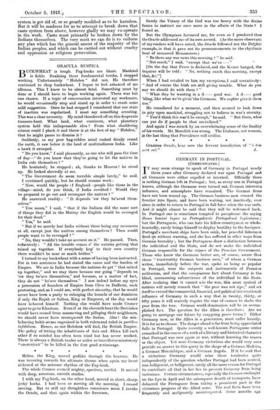ORACULA RUSTICA.
BUCKWHEAT is tough. Fag-hooks are blunt. Mankind is fickle. Realizing these fundamental truths, I stopped working. Unfortunately " Hobden " did not. He therefore continued to chop buckwheat. I began to feel ashamed of me idleness. This I knew to be almost fatal. Something must by done or I should have to begin working again. There was but one chance. If a topic of conversation interested my workmate, he would occasionally stop and stand up in order ta crush some mild suggestion. Once he had stopped I considered that our state of inaction was regularized. I must say something arresting. This was a clear necessity. My mind thundered off on this desperate treasure-hunt. What land, what continent, what planetary system held this indispensable idea ? From what shuddering retreat could I pluck it and throw it at the feet of my " Hobden," that he might pause to dismiss it ?
Suddenly, as my poor hag-ridden mind rushed dizzily round the earth, it saw below it the land of multitudinous India. Like a hawk it swooped.
"Do you know," I said pleasantly, as one who will pass the time of day—" do you know that they're going to let the natives in India rule themselves ? "
He hesitated; he stopped ; ah, thanks to Heaven ! he stood up. He looked shrewdly at me.
"The Government do seem terruble simple lately," he said. I continued quickly, lest he should resume work : "Now, would the people cf England—people like those in the village—mind, do you think, if India revolted ? Would they be prepared to go out and reconquer the natives ? " He answered readily : "It depends 'ow they be'aved them- selves."
"You mean," I said, "that if the Indians did the same sort af things they did in the Mutiny the English would be revenged for their dead."
"Yes," he said.
"But if we merely lost India without there being any massacres at all, except just the natives among themselves ? Then would people want to be revenged ? "
"No, they wouldn't take no account on it." He paused. Then, reflectively : "All the trouble comes o' the nations getting that mixed up together. If everybody kep' to their own country there wouldn't be near so much bother."
I turned to my buckwheat with a sense of having been instructed. For in two sentences he had stated the cause and the burden of Empire. We are in India because the nations do get "that mixed up together," and we stay there because our going "depends on 'ow they be'ave themselves," and because, as a matter of fact, they do not "Wave themselves." I saw indeed before my eyes a procession of founders of Empire from Clive to Dufferin, each protesting, and, as I could see, with perfect sincerity, that he would never have been a party to enlarging the bounds of our dominion if only the Rajah or Sultan, King or Emperor, of the day would have behaved himself. Nothing else would have made Cromer agree to go to Khartum. Even if at the eleventh hour the Dervishes would have ceased from massacring and pillaging their neighbours, we should never, have reconquered the Sudan. Alas ! the mis- behaving habit seems engrained in both rulers and ruled in partibus infidelium. Hence, as our Hobdens will find, the British Empire. The policy of letting the inhabitants of Asia and Africa kill each other if so minded has often been tried but has never worked. There is always a British trader or sailor or traveller or missionary "convenient" to be killed in the first good scrimmage.
Helios, the King, moved godlike through the heavens. He was towering towards his ultimate throne when again my heart sickened at the noisome rhythm of the Fag-hook.
The whole Cosmos seemed mighty, spacious, restful. It moved with deep, sonorous, smooth strides.
with my Fag-hook, on the other hand, moved in short, sharp, jerky hacks. I had been so moving all the morning. I ceased moving. But to still my thoughtless conscience must I invoke the Oracle, and that again within the forenoon.
Surely the Votary of the God was too heavy with the divine fumes to instruct me once more in the affairs of the State ? I feared so.
But the Olympians favoured me, for even as I pondered thus the Oracle addressed me of its own accord. (As the more observant of my readers will have noted, the Oracle followed not the Delphic example, in that it gave not its pronouncements to the rhythmic beat of measured Hexameters.) "Be there any war news this morning ? " he said.
"Not much," I said, "except that we've—" [On the day that Peace is declared, and the Kaiser hanged, the inquirer will be told : "No, nothing much this morning, except that, ezc."] When I had retailed to him my exceptions, I said tentatively : "And of course the Irish are still giving trouble. What do you say we should do with them ? "
"What they be wanting is a d— good war. A d— good 'iding, like what we're givin' the Germans. We oughter give it them too."
He considered for a moment, and then seemed to look down in pity upon mankind, struggling not to believe in war's eternity.
"You'd think this war'd be enough," he said. "But there, what can yer do if people be that uncivilized."
And again I was struck by an overwhelming sense of the finality of his words. Mr. Meredith was wrong. The Irishman, not woman, is the last thing that Providence will civilize.
Gracious Oracle, hear now the fervent benediction of "6 Ode


































 Previous page
Previous page